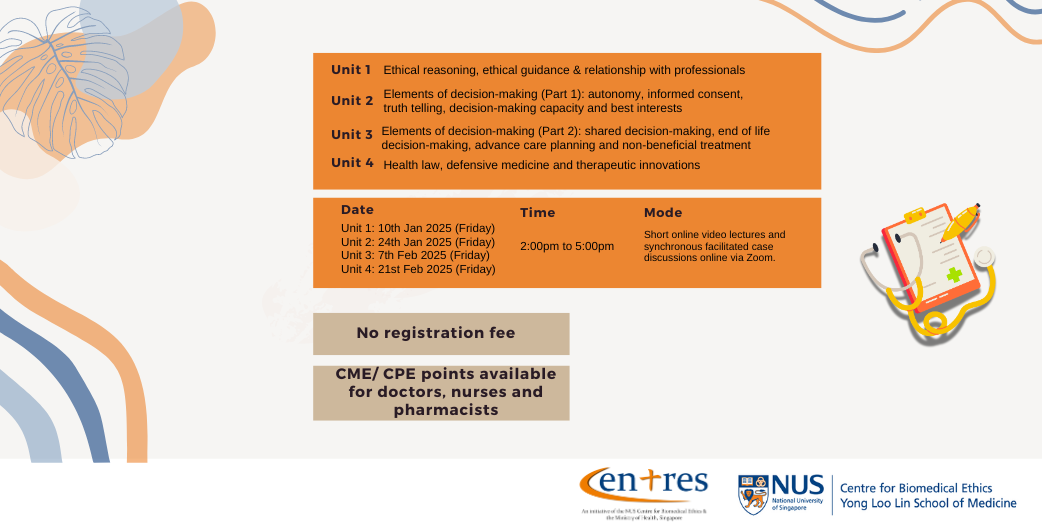- Home
- Education
- Continuing Education & Training
- Essential Topics in Clinical Ethics (ETCE)
ETCE is organized by CENTRES
Overview
The Essential Topics in Clinical Ethics (ETCE) is an intermediate level short course primarily aimed at healthcare professionals and clinical ethics committee (CEC) members. It consists of four units:
Unit 1: Ethical reasoning, ethical guidance & relationship with professionals
Unit 2: Autonomy, informed consent, truth telling, decision-making capacity and best interests
Unit 3: Shared decision-making, end of life decision-making, advance care planning and nonbeneficial treatment
Unit 4: Health law, defensive medicine and therapeutic innovations
Educators

Assoc. Prof Michael Dunn
Associate Professor
CBmE, NUS

Dr Sumytra Menon
Deputy Director
CBmE, NUS

Adj. Associate Prof Lee See Muah
Emeritus Consultant
Department of Medicine
Ng Teng Fong General Hospital (NTFGH)

Dr Neeta Satku
Adjunct Senior Lecturer
CBmE, NUS

Dr Owen Schaefer
Assistant Professor
CBmE, NUS

Mathavi Sengguttuvan
Research Associate
CBmE, NUS
Registration
By invitation only.
Continuing Professional Education
CME/CPE points have been sought for doctors, pharmacists and nurses.
| Topics | Doctors | Nurses | Pharmacists | |
| MME CME | Non-Core CME | CPE | CPE | |
|
Unit 1: Ethical reasoning, ethical guidance & relationship with professionals |
2 | 0 | 2 | 2 |
|
Unit 2: Autonomy, informed consent, truth telling, decision-making capacity and best interests |
2 | 0 | 2 | 2 |
|
Unit 3: Shared decision-making, end of life decision-making, advance care planning and non-beneficial treatment |
2 | 0 | 2 | 2 |
|
Unit 4: Health law, defensive medicine and therapeutic innovations |
0 | 2 | 2 | 2 |
Mode
Short online video lectures and synchronous facilitated case discussions online via Zoom. The short online video lectures may be viewed in a 2-week window before the synchronous case discussions
Course Structure
The series consists of four units. Participants may choose to attend one or more units.
Unit 1 - Ethical reasoning, ethical guidance & relationship with professionals
Duration:
2.00pm to 5.00pm | 10 January 2025 (Friday)
Learning objective:
To understand principle-based approaches to ethical issues in healthcare practice.
Topics covered:
- Approaches to moral reasoning
- Relationship between moral, ethical, legal and professional responsibilities
- Professional codes of ethics and guidance documents
- Relationship between law and ethics and process at ethics
- Resources for understanding & interpreting cultural and faith communities
Target audience:
Healthcare professionals and clinical ethics committee (CEC) members, who are new to or would like to refresh their knowledge and understanding of ethical reasoning, ethical guidance and relationship with professionals.
Unit 2 - Elements of decision-making (Part 1): autonomy, informed consent, truth telling, decision-making capacity and best interests
Duration:
2.00pm to 5.00pm | 24 January 2025 (Friday)
Learning objective:
To understand some of the common ethical and legal issues faced by healthcare professionals regarding patient autonomy, informed consent, truth telling, decision-making and best interests.
Topics covered:
- Autonomy, informed consent and refusal
- Disclosure, medical errors and truth telling
- Proxy decision-making, substituted judgment and best interests
- Decision-making capacity
Target audience:
Healthcare professionals and clinical ethics committee (CEC) members, who are new to or would like to refresh their knowledge and understanding of autonomy, informed consent, truth telling, decision-making and best interests.4
Unit 3 - Elements of decision-making (Part 2): shared decision-making, end of life decision-making, advance care planning and non-beneficial treatment
Duration:
2.00pm to 5.00pm | 7 February 2025 (Friday)
Learning objective:
To understand some of the common ethical and legal issues faced by healthcare professionals, regarding shared decision-making, end of life decision-making, advance care planning and non-beneficial treatment.
Topics covered:
- Advance care planning
- End of life decision-making
- Shared decision making
- Potentially inappropriate treatment / futility
- Treatment goals and the related plan of care
Target audience:
Healthcare professionals and clinical ethics committee (CEC) members, who are new to or would like to refresh their knowledge and understanding of shared decision-making, end of life decision-making, advance care planning and non-beneficial treatment.
Unit 4 - Health law, defensive medicine and therapeutic innovations
Duration:
2.00pm to 5.00pm | 21 February 2025 (Friday)
Learning objective:
To understand relevant health law and some of the common ethical and legal issues faced by healthcare professionals regarding defensive medicine and therapeutic innovations.
Topics covered:
- Relevant health law
- Confidentiality and privacy
- Distinctions between clinical research and therapeutic innovation
- Defensive medicine
Target audience:
Healthcare professionals and clinical ethics committee (CEC) members, who are new to or would like to refresh their knowledge and understanding of health law, defensive medicine and therapeutic innovations.

